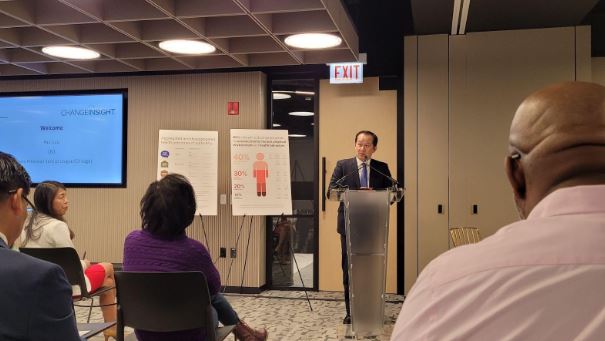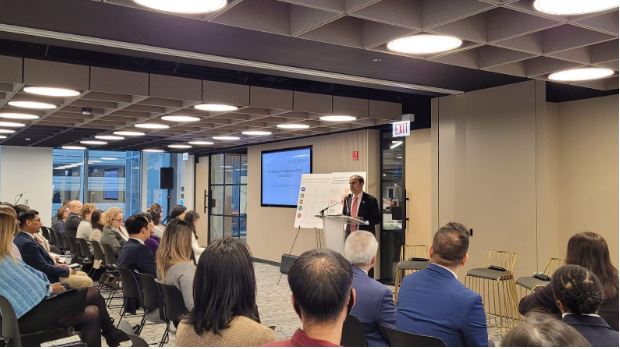By Rachel Kim
Generational challenges and systemic racism are among the top concerns for Asian American, Native Hawaiian, and Pacific Islander (AANHPI) communities.
Change InSight, a partnership with 19 nonprofits including eight in the Midwest, serves 30 AANHPI communities. The coalition recently released their second annual report, highlighting that major health risks include not being able to speak English well and the harmful practice of aggregate data.
The other top health risks are poverty, education, social isolation, and stress, particularly among the top 5 AANHPI communities represented in their 2023 sample: Chinese, Indians, Filipinos, Pakistanis, and Koreans.
The group surveyed some 6,000 people including more than 2,700 AANHPIs served by the Midwest-based non-profits. The resulting report highlights the negative impact of aggregate data on representation, defines the top five health risk factors among AANHPIs and includes multiple policy recommendations.
“Another example from our partner, the Alliance of Filipinos for Immigrant Rights and Empowerment (AFIRE) Chicago, was the revelation that while their community has a higher English proficiency, they had limited Tagalog proficiency, inhibiting their ability to connect with parts of their community. This inspired AFIRE to start Tagalog 101 classes to help connect the generations through language and to preserve the culture. Change InSight is vital because it gives community-based organizations the data needed to advocate for solutions, funding, and policy changes and amplify their impact on the communities,” said Paul Luu, CEO of the Chinese American Service League (CASL).

Change InSight is a unique project that studies the conditions in which individuals work, live, and play – or social drivers of health (SDOH). It also measures the health risks in AANHPI and underrepresented communities using data points. The project gathers information, figures out the needs of communities involved, and disseminates data obtained through surveys. Organizations then use this information to secure resources and develop community-specific target insights and solutions.
“One of the most critical results of the project is that our partners can now uncover new issues while providing measurable insights into existing concerns,” said Luu.
The report also highlights that populations vulnerable to “racism and discrimination, fewer educational or employment opportunities, or limited health care access” are especially prone to health disparities, which may lead to higher death rates. The report determines that social drivers of health (SDOH) account for 80% of health outcomes, unlike medical care which only accounts for 20%, and may prevent health disparities.
The survey’s results dismantles the “Model Minority Myth” – a stereotype characterizing all Asian Americans as intelligent or well-off despite differences in socioeconomic status and experiences – as one of the “false narratives” being perpetrated by aggregation. More so than acknowledging distinctive qualities of “50+ ethnicities, 100+ languages and dialects”, such aggregation may undermine the representation and concerns of origin groups especially in policymaking. The lack of high-quality, disaggregated data about individual communities has eventually led to a shortfall in funding resources for needs.
“The goal of Change Insight is to highlight the negative impact of aggregation on AANHPI communities and the importance of disaggregating data in order to address the needs of each origin group,” said Luu. “We hope to see data disaggregation become the standard for all government and healthcare entities.”
The report disaggregated its data based on Midwest respondents who live in Chicago and Champaign, Illinois. Survey respondents consisted of those accessing social services and predominantly from the immigrant community. Some key findings include that 97% of Chinese respondents have limited English proficiency, 31% of Pakistani respondents lack adequate transportation, and 22% of Filipino respondents have high stress levels.
Nationally, 73% cite limited English proficiency as a challenge with 62% describing themselves as living in poverty, 34% have less than a high school education, 15% live in social isolation and 17% endure high stress levels.
Policymakers and community organizers discussed the significance of the report’s key findings, and how each partner nonprofit puts the data to use to facilitate good outcomes in their communities at a Chicago press conference.
Community organizers who have participated in the inaugural report believe that the disaggregated data collected from Change InSight helps community-based organizations in having more in-depth assessments of the diverse needs of the community.

Apna Ghar, a nonprofit working to end gender violence, is one of the 19 organizations that collected data for the second annual Change InSight report. Eva Mwariri, Apna Ghar’s Community Engagement Coordinator, believes additional efforts besides the analysis of disaggregated data are needed to amplify the impact of policy making.
“Disaggregated data collection is one part of the puzzle in having data to inform policy makers. The other includes collaborating with various tiers of the policy making process, sensitizing various policy makers, and Community leaders relevant to the policies at hand. In other words, a collaborative effort of all stakeholders is what will eventually bring change,” said Mwariri.
The data also allows for more targeted community insights and approaches especially if community-based organizations assess the data sets they submit to Change Insight.
Panelist Eunji Lee who is director of health aging at Hanul Family Alliance discusses the changes in reaction around mental health stigma previous to and following the Change InSight program. Upon receiving data results, the organization was able to determine how stress level and social isolation was worsened by the pandemic in the Korean community.
“People were more aware about the need to tackle social isolation,” said Lee. “Another big thing is we could see a significant decrease in the stigma for mental health, which is a big thing in the Asian community.”
Through a data-powered project like Change InSight, AANHPI-serving nonprofits receive the tools needed to steer at-risk community members towards an equitable direction, while also setting a standard for government and healthcare institutions to improve data collection practices.
“When AANHPI and underrepresented communities work together, we can build our own solutions to any issue,” said Luu. “I would encourage future generations to take this example into consideration whenever they face significant challenges. If you identify a problem within your community that is not being addressed, you have the power to create change.”
(Editor Note: An earlier version of this story incorrectly listed the number of Midwestern non-profits involved in the survey. This updated story also adds some national data.)
AsAmNews is published by the non-profit, Asian American Media Inc.
We are currently funded by our readers and such charitable foundations as the Robert Wood Johnson Foundation, AARP, Report for America/GroundTruth Project & Koo and Patricia Yuen of the Yuen Foundation.’
Find additional content on Bluesky, Facebook, Instagram , Tiktok, X, and YouTube. Please consider interning, joining our staff, or submitting a story, or making a tax-deductible donation.
You can make your tax-deductible donations here via credit card, debit card, Apple Pay, Google Pay, PayPal and Venmo. Stock donations and donations via DAFs are also welcomed. Contact us at info @ asamnews dot com for more info.



